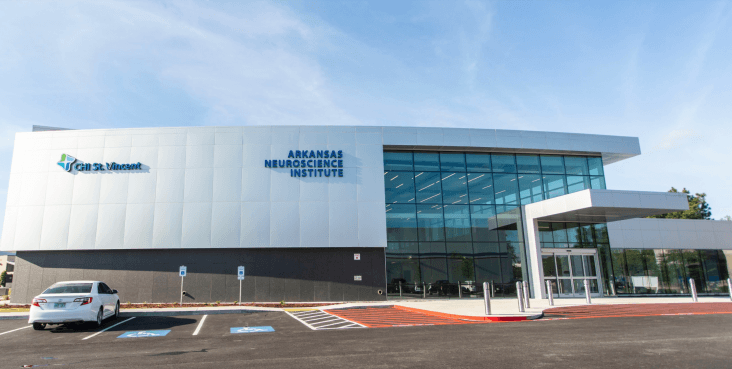CHI St. Vincent opens new neuroscience institute and research center
by June 17, 2019 4:57 pm 1,266 views

CHI St. Vincent in Little Rock announced the grand opening of the new Arkansas Neuroscience Institute and Research and Education Center aimed at improving treatment outcomes for patients.
The center will allow human brain mapping and provide training for neurosurgeons to develop the necessary skills to tackle the most complex cases, hospital officials said.
The center is the culmination of a $30-million project to develop neurosurgery, education and research facilities in central Arkansas. This new center brings hope for patients who had conditions once thought inoperable, according to Chad Aduddell, CEO of CHI St. Vincent.
“This is not just a new building, but a beacon of light for neurosurgeons around the world,” said ANI Director Dr. Ali Krisht. “Neurosurgery as a field is very unknown. This center will become an oasis for all the thinkers and people who deal with neurosurgical problems to come learn with us and at the same time contribute to our learning.”
The center includes the M.G. Yasargil Neurosurgical Research and Education Center and O. Al-Mefty Microneurosurgery Laboratory, named after two of Dr. Krisht’s mentors and fellow recipients of the prestigious international Herbert Olivecrona Award for contributions to the field of neurosurgery.
The laboratory features the only existing space where neurosurgeons can train using The Aboud Model: The Live Cadaver. Created by ANI’s Dr. Emad Aboud, the Aboud Model circulates blood-like perfusate through a cadaver using a cardiac pump to simulate life-like conditions in terms of bleeding, pulsation and softness of tissue, providing surgeons the advanced training they need without the enhanced pressure of operating on a live patient, the release stated.
The center also features a 150-seat auditorium that is equipped with three large projectors using a combination of 3D and laser technologies to live-stream neurosurgical procedures from the microscopic camera navigating areas of a patient’s brain in the operating room. This resource allows students and fellow neurosurgeons to fully witness a surgery and see how the world’s best neurosurgeons conduct procedures or address unexpected discoveries.
“The new ANI Research and Education Center allows CHI St. Vincent to re-enforce our 130-year healing ministry for patients across Arkansas and also gives us the opportunity to reach patients around the world as Dr. Krisht and his team develop and share advanced techniques to improve patient outcomes,” Aduddell said. “Patients with conditions thought inoperable elsewhere find hope and healing at ANI. We’re thankful for our donors and supporters who have helped make this center a reality.”
Neurosurgeons from the Mayo Clinic, University of Illinois Emory University, Creighton University and others from around the world travel to the center throughout the year for training. The expanded center will allow a new generation of neurosurgeons to learn the skills to tackle the most complex cases to positively impact patient outcomes.
Construction of the ANI Research and Education Center was made possible in part thanks to $4 million in donations to the CHI St. Vincent Foundation. The project also included major renovations to CHI St. Vincent North, including four state of the art surgery rooms, advanced imaging resources, a helipad to reduce the transportation time for patients in need of immediate care and an expanded Intensive Care Unit to provide for the unique needs of neurosurgery patients.
The ANI Research and Education Center was developed and designed by the NexCore Group and architects at Taggart Inc. in coordination with the CHI Real Estate and Planning Office. The center was built by Clark Contractors.
CHI St. Vincent said the patients come to central Arkansas from 38 states seeking care from the Arkansas Neuroscience Institute. The team of five neurosurgeons lead by Krisht continually undertakes new research and technology to find the newest state-of-the-art treatments that bring quality of life back to patients. Patients with glioblastomas have a 34% survival rate at three years compared to a national average of 8.8.%
An international symposium on The Future of Microneurosurgery will immediately follow the grand opening with presentations by experts in the field of ultra-microsurgery from 25 nations.
